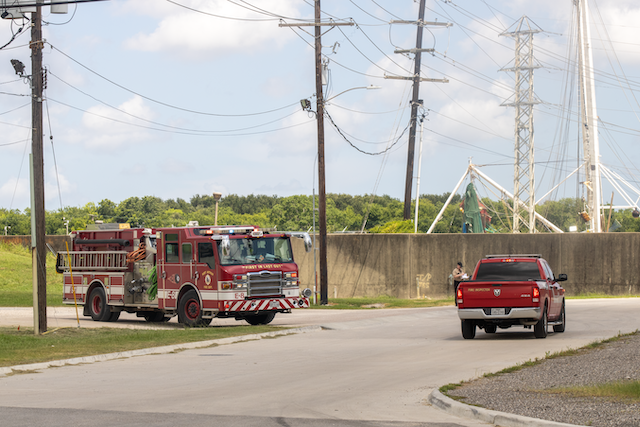Cars, like homes, need replacing too
Published 5:51 pm Tuesday, September 19, 2017
As with everyone else since Hurricane Harvey, the auto industry in Southeast Texas has been busy — very busy.
Allen Tate, managing partner of Mid-County Dodge in Port Arthur, said his staff has been three to four times busier since the flooding as compared to ordinary times.
He said in one month in 2015, the dealership sold 225 cars — 130 new vehicles and 95 pre-owned. This month they have sold 315 vehicles.
Trending
“We beat our old record three or four days ago,” Tate said. “We’ve sold a lot of new cars. Pre-owned are not trading. We have pre-owned from out of state arriving.”
He attributes the dealership’s success to huge rebates and employee pricing from Chrysler. He added it’s one of the best deals he’s seen in 20 years in the car business.
Tate said other dealerships are offering specials, too, in the wake of Harvey.
While buying a new vehicle, however, buyers should check some things out about the car before proceeding.
“There are a lot of things to check for,” he said. “Reach underneath the carpet. Check the storage bins for water. Always pop the trunk and check the spare tire hold.”
Tate believes most reputable dealers won’t sell a flood-damaged car without disclosing it to the customer, but sometimes mistakes are made.
Trending
“We got a half-inch of water in the building. Fifty units on the lot had to be totaled. Water damage can affect the air bags sensors and make them deploy or affect the electronic brain of the car,” Tate said. “We’ve provided some local credit unions a list of what to check for on a car.”
Tate said while dealing with his car suppliers, he has them sign a trade-in declaration at the time of trade and for the buyer to sign.
“I tell them, ‘Just tell me the truth or if it’s damaged, I will sue you,’” Tate said.
On the repair side, Richie Wolford, owner of The Car Cave at 5239 E. Parkway in Groves, said it hasn’t slowed down since the hurricane.
“We’re always really busy. We just added 20 percent to our workload,” Wolford said. “We have 50 cars now, 16 of them are flood cars which would come out to 32 percent. We usually have 30 cars on the property.”
He added that he doesn’t want to hire a temporary mechanic on a temporary basis only to let him go after things cool down.
One thing that Wolford is encountering, he said, is that insurance companies are totaling out vehicles because they don’t want the liability associated with repairing them.
“The insurance companies are saying the cars have chemicals from the water and sewer and they’re a biohazard,” Wolford said. “They were all flooded by fresh water, not salt water. If the mold process has started the adjusters will total it out.”
Wolford said he heard the Federal Emergency Management Agency is assisting with some repairs, but his shop will have to turn that down because it can take a mechanic five to six hours to get an estimate and The Car Cave would have to charge $500 for the estimate.
“We would finish the estimate and find the next problem with the car. There’s no crystal ball,” he said.
For those looking to buy a used car, Wolford cautioned to maybe wait six months to a year so as not to land a flood-damaged vehicle.
“Pull the carpet back and look at the rust and mold. The used car market may suffer,” Wolford said. “For a new car, it’s disclosed in the terms of the sale. At these tote the note places the car is “as is” and it’s buyer beware.”
And on the insurance side, Zulema Escobedo, a Farmer’s Insurance agent, said that Farmer’s stance will not sell back a vehicle if flooded. Most insurance companies do the same.
She added that people who want their cars fixed should ask an adjuster about that first.
“They’re upset they’re (Farmers) are not giving them that option (to repair the car),” she said. “Sensors in the vehicle can get messed up two or three months down the road. Air bags may pop open. Doors won’t lock, etc.
“Now (customers) are happy as long as Farmer’s will pay them out. It’s a safety issue.”
Escobedo said the process is “very, very fast.” An adjuster will take a photograph of the vehicle, look at the water line, and then leave. They enter the information and it will spit out a value within 24 hours.
Currently, Farmer’s has adjusters from all over the nation, some of them independent agents, working in Southeast Texas. For instance last week there were 600,000 in the Houston area and more than one million along the coast.
For customers with only liability insurance, FEMA will help to repair or replace the vehicle if it was the customer’s primary vehicle on the day of the flood. She added that it may take awhile to hear from FEMA.
“This is not normal procedure because it’s a catastrophe,” she said. “Our adjusters have done an amazing job. We ask our customers to please be patient. We’re all in the same boat.”
In addition, rental cars are nearly impossible to come by. One customer had to go to Lafayette, Louisiana to get a rental. Escobedo recommends getting placed on a waiting list.
Escobedo’s agency never really missed a beat. They only closed on Wed., Aug. 30. They were in the office the Tuesday before and back to work on Thursday.
“We were lucky,” she said. “There’s a lot of unity in the community. People just wanted information. It didn’t matter if they were a customer or not. It’s been crazy.”
Escobedo said they worked through Hurricane Rita too with no electricity or running water, but they still had internet.





